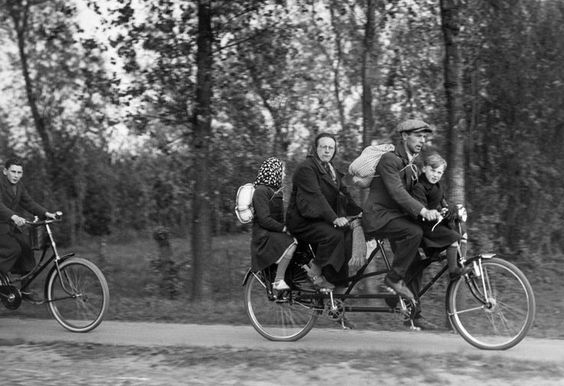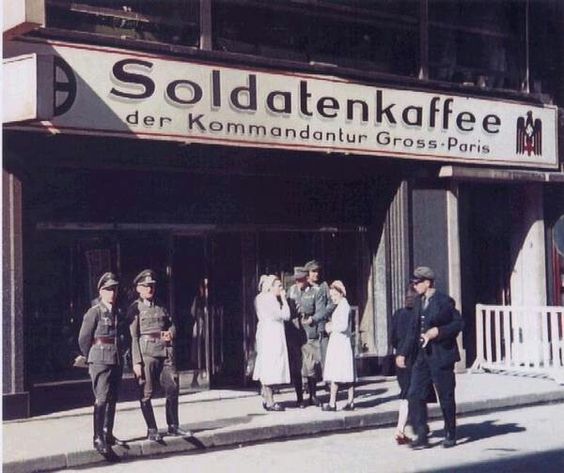Friday 14 June 1940
Western Front: With the French retreating in disarray and many Parisians heading south, the Wehrmacht on 14 June 1940 walks into a quiet Paris. There are only 700,000 inhabitants left in a city of 5 million.
French General Aubert Frere follows orders and pulls his French 7th Army out of Paris. Since the city is not defended, all of its businesses - such as the Renault tank factory at Billancourt and Schneider-Creusot armament works - are intact and ready to churn out weapons for the German conquerors. General Henri Dentz surrenders Paris at the Hotel Crillon.
The Germans stage victory parades with Major General Bogislav von Studnitz's 87th Infantry Division of the 18th Army at the Place de la Concorde and at the Arc de Triomphe. General von Bock of Army Group B reviews the parades, which glide through silent streets. As a fine point, the Wehrmacht men do not march under the arch, but around it.
Elsewhere, the war continues. Hitler, chafing at his Wolfsschlucht headquarters, issues Fuhrer Directive No. 15. Noting the "collapse" of the Allied front, he sets two objectives:
- Prevent the formation of a new Allied front in the south; and
- Destroy the Maginot Line.
The Wehrmacht's Army Group C (von Leeb) sends its 24 divisions against the Maginot Line. The attack is led by the 7th Army against the French 8th Army and has mixed success, scoring some advances in some areas. German 1st Army (Erwin von Witzleben) breaks through at Saarbrücken. To support those attacks, Panzer Group Guderian and other troops swing east to encircle the French positions.
The German spearheads approach Romilly and St. Dizier to the east of Paris.
The 1st Panzer Division reaches Chaumont. German 12th Army is in a position to surround the French 2nd Army Group.
British Prime Minister Churchill, still reeling from the French decision to go it alone on 13 June 1940, telephones Sir Alan Brooke, commander of the BEF, and orders the evacuation of all British personnel from France. Brooke, who has only just arrived, heartily endorses the decision. For its part, French Prime Minister Paul Reynaud's government leaves General Weygand's headquarters at Briare for Bordeaux.
The French air force attacks oil storage facilities in the Venice region. They are scrupulously careful not to bomb the historic islands of Venice.
Battle of the Atlantic: U-101 (Kapitänleutnant Fritz Frauenheim) spots 3,557-ton Greek freighter Antonis Georgandis northwest of Cape Finisterre, Spain. The U-boat surfaces and forces the crew to disembark, and then sinks the Greek ship by gunfire using its deck gun.
U-38 (Kapitänleutnant Heinrich Liebe) spots 5,403 ton Greek freighter Mount Myrto south of Ireland. It also surfaces and attacks the Greek ship with gunfire, but when that proves ineffective, sinks it with a torpedo. There are 24 survivors and 4 crew perish.
U-47 (Kapitänleutnant Günther Prien) torpedoes and sinks 5,834-ton British freighter Balmoralwood about 70 miles southwest of Cape Clear. All 41 aboard survive and are picked up by British freighter Germanic. The Balmoralwood is a straggler from convoy HX-47 and, among other things, was transporting four aircraft to England.
German raider Widder sinks British tanker British Petrol in the north Atlantic.
US destroyer USS Gleaves (DD 423, Lt. Commander Edward H. Pierce) is commissioned.
Battle of the Mediterranean: Three fast Italian destroyers (Turbine, Nembo, and Aquilone) shell Sollum, Egypt.
French warships of the 3rd Squadron (cruisers Foch, Algerie, Dupleix, Colbert and 11 destroyers) bombard oil storage tanks on the Italian Coast in the Genoa/Vado region. Nine civilians perish. French light cruiser Albatross is damaged by Italian coastal fire, with 12 crew perishing.
North Africa: The British 7th Hussars, a company of the Kings Royal Rifle Corps and the Royal Engineers, all led by Lt. Colonel G. Fielden of the 7th Hussars, attack and capture Italian Fort Capruzzo and Maddalena on the Libyan border. The Italians put up little resistance, and 16 Italian officers and 200 other soldiers become POWs.
About 3000 Spanish Moroccan troops occupy Tangiers, heretofore an "International Zone" condominium under joint Spanish, French and British administration. Franco is counting on his "partners" being distracted by larger events, such as the fall of Paris, and he is correct. True to his nature, however, Franco does not actually annex the territory as many in his government urge but instead announces that this is only a temporary wartime measure.
The Regia Aeronautica attacks Sollum in Egypt and Berbera in British Somaliland.
The first dogfight between Italian and RAF fighters takes place over North Africa.
Norway: The German 2nd Mountain Division has been dutifully marching north to relieve General Dietl's 3rd Mountain Division at Narvik. Today, they link up. The event, of course, is of little consequence due to the Allied evacuation. The two divisions now form Mountain Korps Norway under the command of Dietl, who has become one of Hitler's favorite Generals due to his deft handling of his troops when the outlook was very dark.
 |
| The German troops marched around the Arc de Triomphe, not under it (Bundesarchiv Bild 101I-126-0347-09A). |
Accordingly, the Soviets decide to issue an ultimatum to Lithuania. It demands unrestricted access to the country by the Red Army, with the proviso that these troops would form a pro-Soviet government. This is done pursuant to the "secret protocols" of the Ribbentrop/Molotov Pact of 23 August 1939.
The president of Lithuania, Antanas Smetona, proposes to stand and fight. However, the rest of the government has a somewhat more realistic view of the situation and decides to capitulate, so Smetona goes into exile rather than be used to legitimate the takeover.
As part of its emphasis that "Stalin means business," two Soviet DB-3T torpedo bombers shoot down a French-owned Junkers Ju 52 "Kaleva" being used on a Finnish route from Tallinn to Helsinki. All 9 onboard perish. The French government does not lodge any diplomatic protest due to its tenuous military situation. Soviet submarine Щ-301 surfaces and does not rescue anyone, but does fish French diplomatic mail out of the wreckage.
French/US Relations: French Prime Minister Reynaud sends another appeal to President Roosevelt for assistance, pleading that he "throw the weight of American strength into the scales." Roosevelt, however, has no authority or ability - while it would still count - to do any such thing.
French Military: General de Gaulle departs for London.
US Navy: President Roosevelt signs the 11% Naval Expansion Act. Once fully implemented, this will increase the naval tonnage of aircraft carriers, cruisers, and submarines by 187,000 and auxiliary shipping by 75,000 tons. It also will increase naval aircraft by 4,500 planes.
Spies: French and Polish codebreakers, who have been working on cracking the Wehrmacht's Enigma codes, flee south toward Toulouse with their Enigma machines.
Holocaust: Initial shipments of inmates (after those who actually built the camps) arrive at Auschwitz and Theresienstadt in occupied Poland: 728 Poles are marched through Tarnow to Auschwitz.
Cyprus: The company begins forming its Cyprus Volunteer Force.
China: The Japanese are continuing their aerial assault on Chiang Kai-shek's capital of Chungking. They advise the British, American, Russian and German diplomatic communities to seek safer quarters.
The French operators of the Eiffel Tower cut the elevator cables. Wehrmacht troops climb 900+ steps to hang the Swastika flag.
The German occupation forces settle comfortably into Paris immediately. Overall, the Wehrmacht does not discourage fraternization with the locals, many of whom reciprocate.
The Wehrmacht sets up headquarters at the finest hotels in St. Germain and elsewhere, including most notoriously the Hotel Ritz. The draw up a "Parisian campaign map" that shows the best cafes, restaurants and other assorted amusements.
On the whole, the occupation troops act with restraint. However, inevitably there are instances of troops acting with cruelty, taking without paying, and the like. Troops accustomed to rough life in the field are somewhat over-awed with the varied decadent opportunities in Paris and often lose the edge off their military discipline.
The Wehrmacht imposes a 20:00 curfew in Paris using loudspeakers on trucks.
American Homefront: MGM releases "The Mortal Storm," a James Stewart/ Margaret Sullavan drama that is distinguished by being overtly anti-German (though in an abstract fashion that does not name any actual German politicians and so forth). This film directly leads to a ban of MGM films in Germany - though Adolf Hitler continued to snag copies for his own private viewing pleasure. As such, the release of "The Mortal Storm" is a very rare pre-war instance of an American company willingly abandoning the lucrative German market.
 |
| The flow of refugees continues. Here, a tandem bicycle carries a whole Belgian family of four with their possessions strapped to their backs. June 14, 1940 (AP). |
June 1, 1940: Devastation at Dunkirk
June 2, 1940: Hitler Visits France
June 3, 1940: Operation Paula
June 4, 1940: We Shall Fight
June 5, 1940: Fall Rot
June 6, 1940: Weygand Line Crumbling
June 7, 1940: British Evacuating Narvik
June 8, 1940: Operation Juno
June 9, 1940: Norway Capitulates
June 10, 1940: Mussolini Throws Down
June 11, 1940: Paris an Open City
June 12, 1940: Rommel at St. Valery
June 13, 1940: France Goes Alone
June 14, 1940: Paris Falls
June 15, 1940: Soviets Scoop Up Lithuania
June 16, 1940: Enter Pétain
June 17, 1940: The Lancastria Sinks
June 18, 1940: A Day of Leaders
June 19, 1940: U-boats Run Wild
June 20, 1940: Pétain Wilts
June 21, 1940: Hitler's Happiest Day
June 22, 1940: France Is Done
June 23, 1940: Hitler in Paris
June 24, 1940: Six Million Jews
June 25, 1940: German Celebrations
June 26, 1940: USSR Being Belligerent
June 27, 1940: Malta in Peril
June 28, 1940: Channel Islands Bombed
June 29, 1940: Gandhi Insists on Independence
June 30, 1940: Channel Islands Occupied
2020



No comments:
Post a Comment